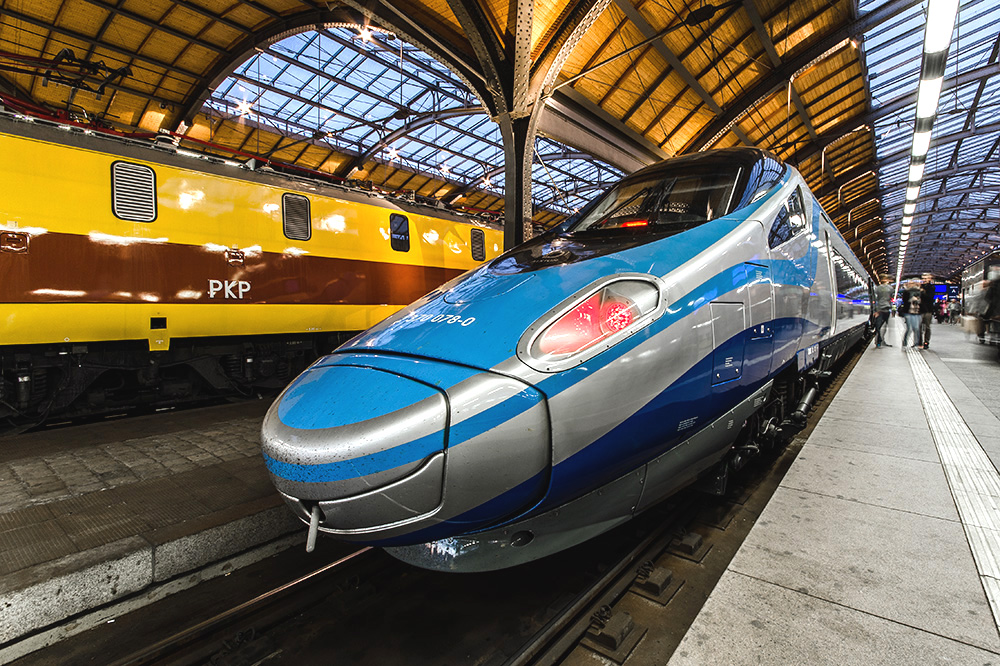A record 58.9 million journeys were made on PKP Intercity, Poland’s main long-distance train operator, last year. That was almost 10 million more than the previous annual high of 49.6 million, set before the pandemic in 2019.
While some Covid restrictions were still in place in early 2022, by May a monthly record of 5.26 million journeys were made with PKP Intercity. Subsequent months brought further growth, peaking with 6.5 million journeys in August during the summer holiday season.
I tak to wygląda. W 2022 roku @PKPIntercityPDP przewiozło prawie 59 mln pasażerów. Pobiliśmy o 10 milionów (czyli o 20%) nasz rekord wszechczasów z 2019 roku. Dla porównania, w roku 2015 PKP IC przewiozło zaledwie 31 mln pasażerów.
Gratulacje dla wszystkich pracowników PKP IC! pic.twitter.com/ZZNIkHrFsj
— Tomasz Gontarz (@TGontarz) January 2, 2023
The growth may be down to investment in new rolling stock, the introduction of a special promotion allowing the purchase of tickets at low prices, and the rise in prices of fuel, which encouraged Poles to switch to public transport, reports industry news service Obserwator Logistyczny.
Last year also saw millions of refugees from Ukraine cross into Poland, with PKP Intercity offering them free tickets on its services in the months after Russia’s invasion. On 1 April, the operator announced that up to that point 1.1 million Ukrainians fleeing the war had made use of the free tickets.
Meanwhile, Poland’s largest train operator in terms of passenger numbers, Polregio, which focuses on smaller local and regional connections, also saw a boom in travellers last year.
By the end of October 2022, 72 million journeys had been made with Polregio, more than in the same period of 2019. The operator’s CEO, Artur Martyniuk, predicted that the figure would reach 100 million by the end of the year, significantly more than the annual record of 89 million in 2019.
After decades of neglect, Poland’s rail network is expanding and modernising.
However, more needs to be done to integrate it with other elements of the transport system, writes @MarcinZyla https://t.co/I3AnCXgBsh
— Notes from Poland 🇵🇱 (@notesfrompoland) July 11, 2022
PKP Intercity’s boss, Marek Chraniuk, expects passenger numbers to continue “significantly improving” in upcoming years thanks to further investment in the rail network.
In January 2022, the operator announced that it was increasing the funds it would invest by the end of the current decade from 19 billion zloty (€4.1 billion) to 27 billion zloty (€5.8 billion), of which 24.5 billion zloty will be spent on rolling stock and 2.6 billion zloty on infrastructure.
The company plans to run around twice as many trains in 2030 as today. By then, the operator’s trains are to have been largely replaced or modernised, including being tailored to the needs of different groups, such as people with disabilities and those travelling with children.
The government is doubling the size of its rail investment programme to 11 billion zloty (€2.4 billion), with a particular focus on linking small- and medium-sized towns to large cities https://t.co/P7atq9pTFB
— Notes from Poland 🇵🇱 (@notesfrompoland) April 20, 2022
PKP also wants train travel with a speed of 160-250 km/h to become the norm. Currently, the fastest trains on Polish tracks are Italian-made Pendolinos running between the largest cities at speeds of around 160-200 km/h, though they are able to reach 250 km/h.
“Our goal is to popularise train travel as much as possible,” says Chraniuk. “The past year has shown that we are on the right track…[and] thanks to investments in rolling stock and infrastructure…the fashion for rail will become even more widespread.”
PKP also, however, faces challenges from rising energy prices. Today the firm announced a 17% increase in ticket prices, blaming “growing operating costs, resulting primarily from higher electricity prices”.
Poland's "Wars" dining cars, founded over 70 years ago, have become an institution.
Once known for rowdy drunken antics, they became a mixing place for all social classes and today are beloved by train buffs for their hearty, freshly made Polish cuisine https://t.co/yyPrd0LUap
— Notes from Poland 🇵🇱 (@notesfrompoland) March 30, 2021
Main photo credit: M. M. Czarnecki/Flickr (under CC BY-NC 2.0)

Alicja Ptak is deputy editor-in-chief of Notes from Poland and a multimedia journalist. She has written for Clean Energy Wire and The Times, and she hosts her own podcast, The Warsaw Wire, on Poland’s economy and energy sector. She previously worked for Reuters.




















